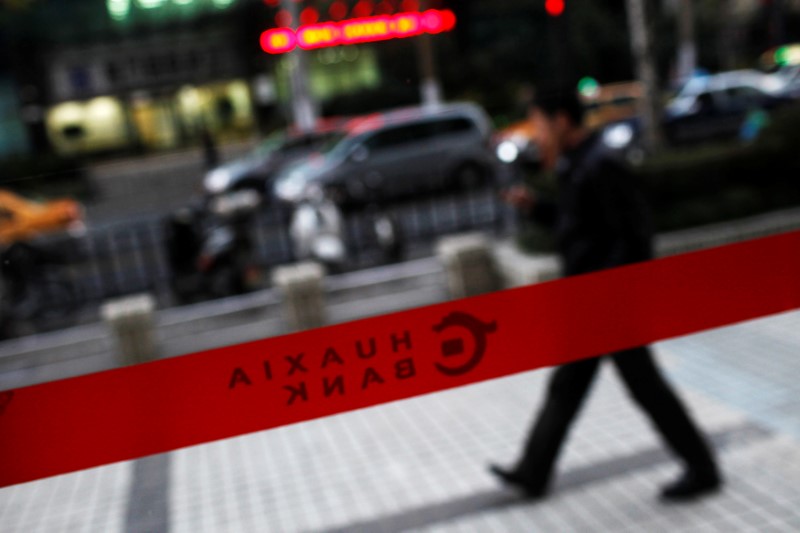By Samuel Shen and John Ruwitch
SHANGHAI (Reuters) - At a Hua Xia Bank branch in Shanghai's financial district, Wang Shujuan, a 72-year-old retired doctor, is looking at moving her money out of a high-yielding wealth management product into a bank deposit bearing an indefinite rate of return.
For Wang and other Chinese retail investors opting for this new, aggressively-marketed "Wisdom & Reward" product the decision seems perfectly rational.
Under China's new rules for its asset management industry, banks' wealth management products (WMP) are no longer allowed to offer guarantees on the principal and returns. "Wisdom & Reward", a principal-protected structured deposit product, is seen by investors like Wang as a fine alternative.
"I'm thinking of moving my money into 'Wisdom & Reward' so that I can sleep sound at night," Wang said. "I can live with lower returns."
Risk-averse customers such as Wang are sought-after trophies in an escalating deposit war between banks, whose wealth management businesses face an existential threat from the tougher asset management rules, which were published last month.
According to the rules, designed to reduce risks in China's $15 trillion asset management sector, explicit or implicit guarantees, a common practice used by banks to woo customers seeking higher returns than deposits, are banned.
Fearful of a client exodus, banks are aggressively marketing structured deposits - a combination of mundane savings and risky derivative trading - to retain customers.
Compared to the guaranteed 5-percent-plus returns on wealth management products, these deposits simply guarantee the principal and an undefined yield of anywhere between 1.5 and 8 percent. But they are selling well.
Bank of Communications (BoComm) has launched a series of structured deposits that indicate annualized returns exceeding 4 percent - much higher than the benchmark one-year deposit rate of 1.5 percent.
"Many clients like this product, because it's principal-guaranteed," said Chen Chen, a BoComm customer manager, adding that several tranches of the products had been sold out soon after launching.
WHACK-A-MOLE
The structured deposit is further evidence of China's struggle to regulate its massive banking sector, where every regulatory attempt to reduce risk leads to innovative products to circumvent curbs.
Investors are attracted by these new bank deposits because they offer them a sense of safety as well as the possibility of high returns - actual yields are linked to the performance of the underlying assets the banks use derivatives to bet on.
Banks are embedding derivatives into regular savings deposits to generate higher yields for clients. China Merchants Bank has pegged its deposit rates to gold prices. Bank of China is marketing a deposit product that bets on the exchange rates of the U.S. dollar and Japanese yen.
Central bank data shows these products have caught on. Outstanding structured deposits at Chinese banks jumped 47 percent from a year earlier to 8.8 trillion yuan ($1.38 trillion) at the end of March.
In contrast, bank WMPs, most of which are off their balance-sheets and hence the target of the government crackdown on shadow banking, grew less than 2 percent last year to 29.54 trillion yuan. WMPs are expected to shrink further this year, snapping a streak of breakneck growth averaging 50 percent during the 2011-2015 period.
As their role as intermediaries in wealth management products diminishes, banks are desperate to retain clients and deposits. The intense competition has however seen heavy inflows of retail cash into bond funds and money market funds this year.
PRICE TO PAY
While it's early days, the risk is that these new deposits push up bank funding costs and threaten their margins.
"Life would be especially tough at smaller lenders whose rapid growth was driven by aggressive expansion" in WMPs, said Qiu Gaoqing, chief analyst at BoComm. "They really need to tighten their belts."
Lenders such as Ping An Bank and China Merchants Bank have already seen shrinking margins during the first quarter, despite higher loan demand in a recovering economy.
Another concern is that banks will use these structured deposits as a new tool to circumvent regulations, particularly as there are no dedicated rules governing these products.
Some of the products don't specify how much of a client's money will be diverted to derivatives trading, and how gains are distributed.
"Structured products could be quite tricky," said Zhou Liang, fund manager at Minority Asset Management, who holds shares in Chinese lenders.
"You don't know how much you've paid for those expensive derivative transactions. The prospects of high returns, could be quite elusive."
